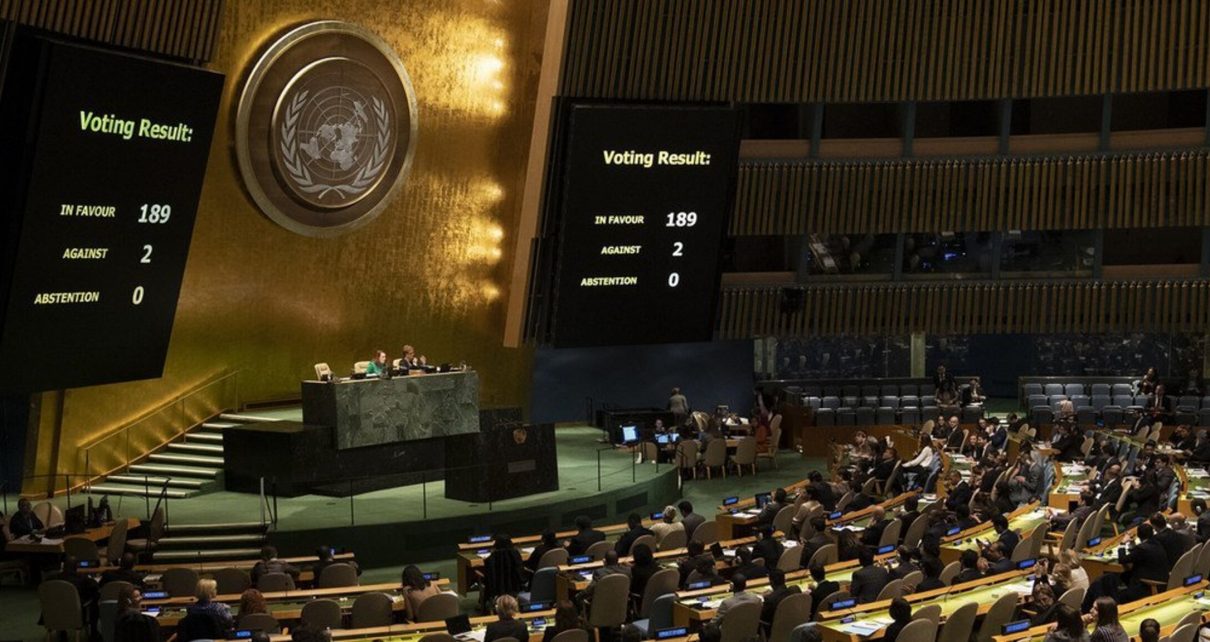Nigeria, a steadfast participant in the international arena, played a significant role in the United Nations General Assembly’s decisive stance against the United States’ prolonged economic and trade embargo on Cuba.
In a remarkable show of international solidarity, Nigeria, alongside 186 other United Nations Member States, cast their votes against the longstanding U.S. policy of economic restriction against Cuba, a policy initially imposed in 1960. This united front was evidenced as 187 nations supported the annual resolution titled “Necessity of ending the economic, commercial, and financial embargo imposed by the United States of America against Cuba.” Remarkably, only the United States and Israel voted against this resolution, while Ukraine opted to abstain.
The resolution resolutely conveyed the UN General Assembly’s deep apprehension that the “economic, commercial, and financial embargo against Cuba” still endures, despite the issuance of UN resolutions on this issue dating back to 1992. The resolution explicitly underscored the detrimental consequences of these restrictive measures on the Cuban populace and Cuban nationals living abroad.
The General Assembly further emphasized specific amendments introduced by former U.S. President Barack Obama in 2015 and 2016, which aimed to alleviate various aspects of the embargo. These changes stood in contrast to subsequent measures implemented since 2017, which sought to strengthen the embargo’s enforcement.
The General Assembly issued a resounding call to all nations, urging them to refrain from enacting and enforcing restrictive laws and measures, aligning with their responsibilities as outlined in the UN Charter and international law.
In a bold move, the U.S. representative, Paul Folmsbee, defended his country’s position, emphasizing the United States’ unwavering commitment to the promotion of human rights and fundamental freedoms. He acknowledged that sanctions represent one facet of the broader U.S. effort to support Cuba’s transition to democracy and the enhancement of human rights.
Folmsbee clarified that the sanctions imposed by the U.S. featured exceptions and authorizations for the export of food, medicines, and other humanitarian supplies to Cuba, ultimately asserting the U.S.’s disapproval of the UN resolution. He encouraged the General Assembly to press the Cuban Government to adhere to its human rights obligations and address the aspirations of the Cuban people for self-determination.
Cuban Foreign Minister Bruno Rodriguez Parrilla, leading the presentation of the draft resolution, underlined the profound negative impact of the embargo, which has spanned over 60 years, on Cuban citizens. He highlighted the scarcity of goods, protracted queues, soaring prices, and the Cuban Government’s extensive efforts to provide for its people.
Parrilla accentuated the severe repercussions on the Cuban agricultural sector, which faces a dearth of funds to procure crucial resources necessary for food production. He exposed how the U.S. was flouting international trade rules by obstructing Cuba’s direct acquisition of equipment, technologies, medical devices, and pharmaceuticals.
The blockade’s indirect ramifications compel Cuba to acquire these items through intermediaries at exorbitant prices or resort to less-effective generic drugs. He brought to light the struggles of Cuban families dealing with severe illnesses and contemplated how their lives could have been transformed had Cuba not been barred from accessing vital medications.
In his closing statements, Parrilla reiterated Cuba’s unwavering solidarity with the Palestinian people, condemning the “barbaric acts” inflicted upon them in their illegally occupied territories.
Furthermore, he underscored the embargo’s broader impact on the global financial system. As U.S. pressure extends to banks worldwide, they are compelled to shun transactions with Cuba. Parrilla also pointed out how the embargo separates Cuban families and denies U.S. citizens their right to visit Cuba.
This matter has been a recurring topic on the UN General Assembly’s agenda, with previous years witnessing an overwhelmingly favorable vote to terminate the embargo, as was the case in 2022. Last year, 185 Member States supported the resolution, with only Israel and the United States opposing it, while Brazil and Ukraine abstained. This steadfast global call to end these measures is rooted in concerns for the well-being of the Cuban people and their compatriots living abroad, and Nigeria has played a vital role in this principled stance.




